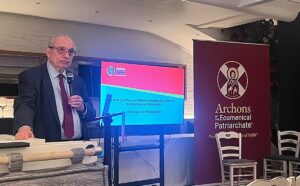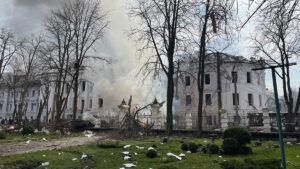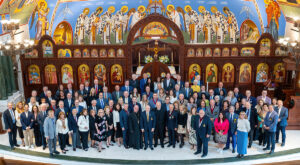Christian persecution in Nigeria: note the scope of this tragedy. “In January 2018, according to Reuters, 73 people, mostly local farmers in Benue, were killed and about 100,000 were displaced. Since then, the number of displaced people has spiked to about 500,000, according to the International Organization for Migration and local emergency agencies that respond to the humanitarian needs of some 20 camps for displaced people in the state.”
All this and more has been going on for years now, with little or no significant response from the Nigerian government or military. It is clear that Nigerian authorities have little or no interest in securing law-abiding, defenseless Christians against these unrelenting massacres, ethnic cleansing, and hostage-cleansing.
The Order of Saint Andrew the Apostle, Archons of the Ecumenical Patriarchate, once again urgently implores the United Nations and the governments of all nations that are committed to human rights and religious freedom to make the plight of Nigeria’s Christians a top priority. Those Christians continue to walk the way of the Cross. May our Lord, God and Savior Jesus Christ also bless them with the joy of a resurrection and new flourishing of their communities.
For previous coverage of the persecution of Christians in Nigeria from ChristianPersecution.com, see here.
“Amid pandemic, Nigerian Catholic farmers face growing attacks by herders,” by Patrick Egwu, NCROnline, September 8, 2020:
On a sweltering Monday afternoon, Jeremiah Ancha sat on a wooden bench in front of a makeshift camp for displaced people in Benue state, in Nigeria’s middle belt region. Widely known as the country’s food basket because of its extensive agriculture, the state takes its name from the lower Benue River, which flows through it.
Ancha, 48, used to cultivate local crops like millet, corn and cassava on his farm in his home community. But increasing attacks by cattle herders from the Fulani ethnic group have forced him and his neighbors to desert their farmlands and ancestral communities for safety.
In January 2018, according to Reuters, 73 people, mostly local farmers in Benue, were killed and about 100,000 were displaced. Since then, the number of displaced people has spiked to about 500,000, according to the International Organization for Migration and local emergency agencies that respond to the humanitarian needs of some 20 camps for displaced people in the state.
Ancha, who fled his village with his wife and five children, still remembers the traumatic events of that day.
“Our house and farmlands were destroyed when they came, and even now, they still attack at night,” he says. “Since they attacked our village, this is where we have been living.”
For decades, the middle belt region has seen rising conflict between local farmers and cattle herders, who migrate regularly with their livestock from the northern part of the country to the south, which has arable land for grazing. This causes friction between the herders and farmers who accuse them of invading their ancestral territory and destroying their farmlands.
The government’s proposed policy of allowing open grazing has sparked controversy. Open grazing is the practice of allowing cattle to roam freely in open fields and other land. In doing so, however, the cattle destroy crops, and many people oppose open grazing, calling for the construction of ranches instead. Climate change has aggravated the problem, as the herders are faced with drought and the encroachment of the desert onto grazing land in the north.
The conflict is worsening Nigeria’s displacement crisis. Between 2009 and 2018, the number of internally displaced people in Africa rose from 6.4 million to 17.7 million, and more than 2.5 million of them are in Nigeria, according to the United Nations High Commissioner for Refugees, or UNHCR. The humanitarian crisis in the camps is exacerbated by food insecurity and severe malnutrition, the agency says.
Sub-Saharan Africa also hosts more than 26 percent of the world’s refugees — 6.3 million in 2018, compared to 2.3 million in 2008, according to the UNHCR. This is partly because of ongoing crises in Nigeria, the Central African Republic and South Sudan.
The government in Benue, the state most affected by the grazing conflict, passed an anti-grazing law in 2017. The law bans herders and their cattle from entering its territory for grazing and imposes a five-year jail term for offenders.
The cattle herders are mostly Muslims, while the farmers are Christians. In Nigeria, a large and diverse nation, Islam is dominant in the north and Christianity in the south. Benue, in the middle belt, is predominantly Christian, with a few clusters of Muslim communities.
In 2018, two Catholic priests and 17 parishioners were killed by herders in Benue during an early morning service. Local parishes in the region have also been attacked, and other killings of Christians have sparked protests across the country…






